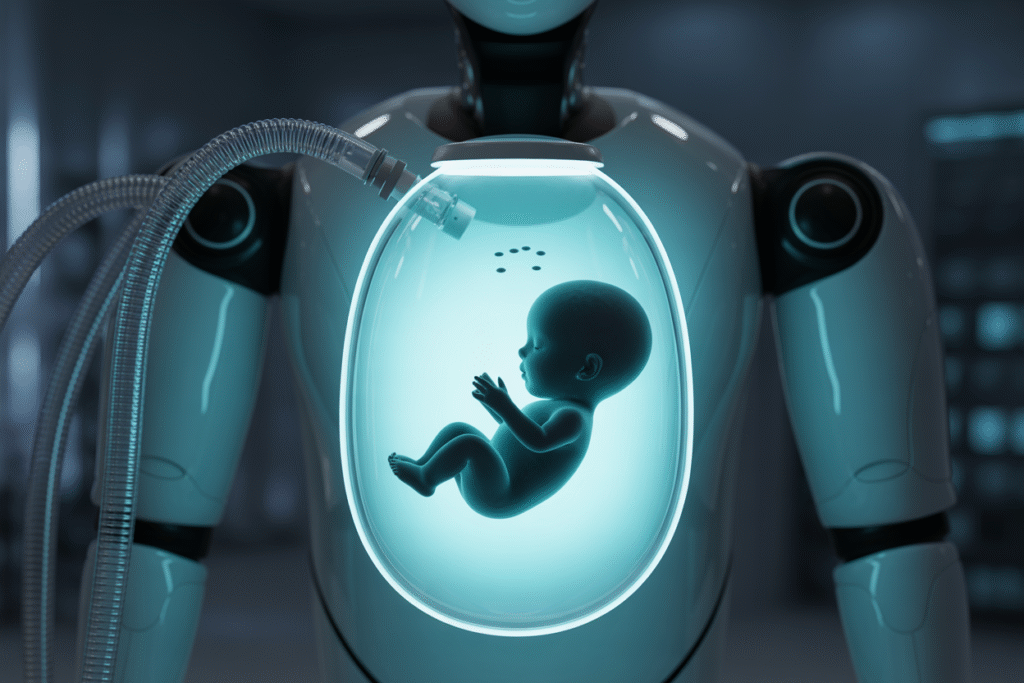China’s $14k artificial-womb robot promises to end infertility—at the cost of redefining motherhood itself.
A Chinese startup just announced a humanoid robot with a built-in artificial uterus that can carry a pregnancy to term—for under $14,000. The internet lost its mind. Will this end infertility or erase motherhood as we know it?
The Robot Womb That Broke the Internet
Imagine a robot cradling a newborn while scientists cheer. That image exploded across Chinese social media last week when a biotech firm announced its artificial-uterus humanoid will hit the market next year for under $14,000. The company claims the bot can carry a fetus for the full 40 weeks, feeding it nutrients through an umbilical-cord-like tube while the embryo floats in lab-made amniotic fluid. Animal trials, they say, went flawlessly. Human trials? That’s where the story turns from miracle to minefield.
Critics immediately pictured a factory line of mechanical wombs pumping out babies on demand. Supporters countered with stories of couples who lost multiple pregnancies and see this as their last hope. Both sides agree on one thing: if the tech works, it will rewrite biology textbooks and family trees in a single stroke.
The device itself looks like a sleek, translucent capsule mounted inside a humanoid frame. Cameras monitor every heartbeat; algorithms adjust oxygen and glucose in real time. The company even promises live-streaming so anxious parents can watch their child grow 24/7. It’s part incubator, part nanny, part reality show.
Yet beneath the glossy marketing lies a tangle of ethical knots. Who owns the embryo if the parents divorce midway through gestation? Could governments mandate artificial wombs to hit population targets? And what happens to the mother-child bond when a machine does the carrying?
Population Crisis Meets Sci-Fi Fix
China’s birth rate has been falling for eight straight years. The government has tried cash incentives, longer maternity leave, even matchmaking events, but babies remain scarce. Enter the artificial uterus—a silver-bullet solution that could sidestep the messy realities of human pregnancy altogether.
State media quickly framed the robot as patriotic tech, a way to “rejuvenate the nation” without asking women to sacrifice careers or health. One viral post claimed the device could boost births by 30 percent within a decade. That stat, unverified, was retweeted by party officials before lunchtime.
Demographers aren’t so sure. They point out that cost, not biology, is the bigger barrier. Raising a child in Shanghai now averages $75,000 before college. A robot womb might remove morning sickness, but it doesn’t pay for diapers or kindergarten.
Still, the symbolism is potent. In a culture where grandparents traditionally pressure couples for grandchildren, gifting a mechanical womb feels like a national apology: “Sorry we made child-rearing impossible—here’s a robot to do it for you.” Whether that apology lands is another question.
Meanwhile, feminists are split. Some hail liberation from pregnancy’s physical toll; others fear it reduces women to egg donors while the state claims the offspring. The debate rages on Weibo under hashtags that translate roughly to #WombFreedom versus #BabyFactory.
When Life Begins in a Server Farm
Bioethicists worldwide dropped their coffee when the news broke. The core worry isn’t technical failure—it’s moral overload. If embryos can be grown outside human bodies, the line between person and product blurs fast.
Take consent. Can an embryo agree to be gestated by a machine? Absurd, yet legal systems may have to decide. Then there’s the question of defects. If the algorithm detects Down syndrome at week 12, does it alert parents, adjust nutrients, or quietly terminate? Each option opens a Pandora’s box of liability.
Religious leaders rushed to condemn what they call “mechanized reproduction.” The Vatican issued a statement within 24 hours, calling the device “a violation of natural law.” Islamic scholars debated whether a machine-born child inherits the same rights as one carried by a mother. Even secular ethicists worry about a slippery slope toward designer babies.
Privacy advocates see darker risks. The robot’s cloud-connected sensors collect terabytes of biometric data—heart rate, hormone levels, genetic markers. Who owns that data? Hackers already target baby monitors; imagine the black-market value of prenatal genomes.
And then there’s the child. Psychologists warn that bonding could suffer if the first human touch comes months after birth. Studies on premature infants show skin-to-skin contact is vital. Can a robot’s silicone arms replicate a mother’s heartbeat? The science says no, but the marketing says “soon.”
From Black-Market Kits to K-Pop Endorsements
Not everyone is waiting for the ethics committee. A black-market version of the artificial uterus reportedly appeared on Taobao within 48 hours—price tag $45,000, no questions asked. Screenshots show a DIY kit shipped in plain boxes labeled “aquarium parts.”
The listing was removed, but not before sparking a Reddit thread titled “Build-a-Baby Workshop.” Users swapped schematics, debated nutrient formulas, and joked about overclocking fetal growth. Moderators eventually shut it down, citing “potential harm to theoretical minors.”
Venture capital smells profit. At least three Silicon Valley funds have flown teams to Shenzhen for secret demos. One leaked pitch deck promises “Uber for babies”—a subscription model where parents rent womb-bots by the trimester. Investors salivate at the TAM: 48 million infertile couples worldwide.
Meanwhile, celebrities are flirting with endorsements. A K-pop star posted an Instagram story captioned “Future mom goals?” next to the robot’s sleek silhouette. The post garnered 2 million likes and a flood of brand-deal offers. Nothing sells like aspirational tech wrapped in baby fever.
But regulators are circling. The FDA has no framework for mechanical gestation; the EU is scrambling to update its AI Act. China itself may ban exports if the tech proves too sensitive. For now, the gray market races ahead while lawmakers draft memos.
Your Move, Humanity
So where does this leave us? On one side lies a medical revolution that could end miscarriages, save mothers’ lives, and grant parenthood to millions. On the other, a dystopia of commodified children, state-controlled reproduction, and babies raised by Wi-Fi.
The truth is likely somewhere in between. Artificial wombs will arrive in stages—first for extreme preemies, then for high-risk pregnancies, and finally as an elective luxury. Each step will spark fresh outrage and fresh hope.
What we can do now is demand transparency. Ask who codes the algorithms, who audits the data, and who profits when a child takes its first mechanical breath. Push for laws that treat embryos as more than datasets and parents as more than customers.
Because once the first robot-born baby cries, history won’t rewind. The question isn’t whether this future comes—it’s whether we shape it or let it shape us.
Ready to join the conversation? Drop your take below and let’s figure out the kind of world we want the next generation to inherit—robot midwives and all.


